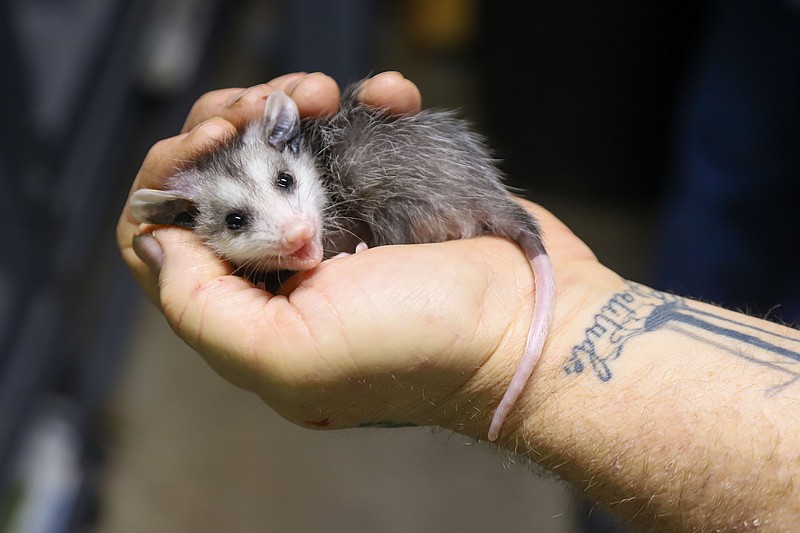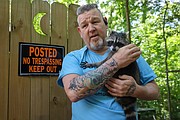Chattanooga is home to one of the nation's largest possum rehabilitation facilities, Opie Acres, where the number of possums and other small mammals is growing every day thanks to a steady influx of babies arriving this spring.
"Just within the past month and a half, we have been bombarded all day, every day," said founder and Clinical Director Jerry Harvey, referring to calls he has received from people finding baby possums and other small mammal newborns.
Harvey has been rehabilitating wildlife for 40 years, on and off, and he opened his own facility focused on possums in 2017. Opie Acres serves a variety of other small mammals, including skunks, raccoons and groundhogs. As a private facility, it's not open for public visits.
He gestured toward an outdoor enclosure containing three baby groundhogs, which he said arrived separately during the past week. They made whistle-like sounds as they eagerly gnawed on ears of corn.
Before starting Opie Acres, Harvey pictured himself caring for around 15-20 animals at a time. His current patient load of nearly 260 animals far exceeds his original estimate.
But he's not turning away new patients. If people find a small baby mammal that appears unhealthy or in distress, he recommends taking a photo of the animal to send to him.
If he doesn't care for that type of animal, Harvey said he can connect people with a Chattanooga wildlife rehabilitator who does. Animals that people attempt to raise themselves often end up at the facility later, when their caretakers realize they are unequipped to handle them.
(READ MORE: Chattanooga area wildlife rehabilitators help care for animals in need)
Volunteer Janine Boland held a possum named Peter, a former pet who was surrendered to Opie Acres, and pointed out his long canine teeth.
"The males usually have the bigger teeth, just to be very impressive," she said, adding male possums also make a clicking sound similar to a camera shutter in order to catch the attention of female possums.
Like Peter, most of the facility's permanent residents were once kept illegally as pets and are now incapable of living in the wild.
"They usually get found when they're little, and then they are so cute and so sweet, and then they get to be teenagers and they get wild," Boland said. "Then people are like, 'He's not so sweet anymore, we can't handle him.' And he is actually still very sweet, he just needed other stuff to do."
Surrendered pets like Peter and other animals incapable of living in the wild become education animals that participate in the center's outreach programs.
Injured and orphaned animals go to a building on the property known as the hospital.
"This young lady was hit by a car, and she has several small babies in her pouch," Harvey said, pointing to an injured female.
Possums carry fetuses in the womb for eight to 12 days after conception, and babies are the size of jelly beans at birth, he said.
Like kangaroo babies, they crawl up into their mother's pouch and stay there for several weeks, Harvey said.
He pointed out a baby female possum, estimated to be about 13 weeks old, that was just brought into the facility after she fell from a ceiling tile into the basement at the YMCA downtown.
Like most young wildlife brought to Opie Acres, she was cold and hungry. She was given fluids, a big meal, and medicine for worms and fleas.
"She has now found her little pouch and is happy as a lark," Harvey said of a little woven pouch inside her cage. "She will actually go outside as soon as she feels better."
Possums can give birth to as many as 20 babies at a time, but only 13 can survive since mothers have just 13 nipples — a circle of 12 with one in the center. About six babies are in a typical litter, known as a passel, he said.
Caring for baby mammals around the clock, Harvey said he is covered in poop and milk most of the time and jokes he sometimes feels like a new mother himself.
A paramedic of 23 years, longtime vet tech and anesthesia tech for a local veterinarian, Harvey does most medical procedures at Opie Acres himself, aside from chest or abdominal surgeries. Christian Keller, a Signal Mountain veterinarian who serves as the head vet for the Tennessee Aquarium, and Shannon Dawkins of Claws and Paws are two vets who work with Opie Acres, Harvey said.
Help wanted
The rehabilitation center is in need of volunteers, as it has about half the number of volunteers it had in the past. Harvey said he is unsure why, but the problem is one that many other wildlife rehabilitators are experiencing now.
In one of two outdoor play yards enclosed in wire, volunteer Christina Young played with a young male raccoon. He bounded toward her and latched on to her leg, which he repeated multiple times before clinging to her arm with all four paws as she swung him back and forth.
Young is the volunteer coordinator for Opie Acres, which she said has become therapy after losing her son in a drowning accident two years ago. She discovered Opie Acres on Facebook and fell in love on her first visit.
(READ MORE: Local wildlife rescue cares for rare naked raccoon found in Chattanooga)
"My son was a huge animal lover," she said. "I think about how cool it would be if he were here doing it with me, and how proud he probably is. ... This place probably gives me more than I give it."
Opie Acres requires volunteers to be at least 17 years old for insurance purposes, although teenagers ages 14-16 can volunteer with a parent.
All volunteers undergo four, four-to-six-hour training sessions. Playing with animals is part of the job, but so is cleaning out enclosures, raking and washing dishes.
In the second play enclosure, a large female raccoon called Mama Cass angrily growled. Harvey said she is a former pet whose diet consisted mainly of Little Debbie snack cakes and junk food, and she was twice her current size when she arrived. She's typically sweet but is now in heat, which is the source of her anger, he said.
Pointing to a row of about a dozen outdoor cages, Harvey said they contain possums that are two steps away from being released back into the wild.
"This gets them used to the sights and smells of outside," he said.
(READ MORE: The best Chattanooga social media accounts local animal lovers should follow)
Next they will go into one of the "compounds" in the woods on the property, which is the final step before release.
Along with fewer volunteers, Opie Acres – which takes about $70,000 a year to operate – has seen a decline in donations as well. That's a problem shared by other rehabilitation centers, Harvey said.
"As far as wildlife rehabs go, most everybody works out of their home, garage or something like that," he said, adding that no state funding is available for wildlife rehabilitation. "All of our cages are handmade and donated and rusty, but in comparison, we're pretty darn lucky to have everything we have."
To report orphaned or injured wildlife, contact Opie Acres at 423-255-6460 or opieacres1@gmail.com.
Which word?
The marsupial at Opie Acres can properly be called a possum or an opossum. Both terms are correct, according to Merriam-Webster, although opossum is generally preferred for scientific or technical writing, and possum is preferred for everyday usage.
According to Google Books, possum has been more common in published material since 1993. Opossum used to be much more common than the alternative, peaking in 1939.
Even when spelling the word as opossum, there are two acceptable pronunciations, according to the dictionary. One has a silent O at the beginning, so the word just sounds like possum, and the other articulates the O, sounding like "a possum."
The wildlife facility takes its name from opossum, deriving Opie as a nickname from opossum.
Contact Emily Crisman at ecrisman@timesfreepress.com or 423-757-6508.

